Special programs
Index / Activities / Special programs / Casa Árabe is celebrating the Nights of Ramadan with a special online schedule of events
Casa Árabe is celebrating the Nights of Ramadan with a special online schedule of events
From April 21, 2020 until May 23, 2020
ONLINE
Casa Árabe channels on social media. #QuédateenCasa #JustStayHome
In Spanish.
The activities include conferences in the form of podcasts, music
videos, children’s storytelling sessions, cooking, dance and handicraft
workshops, and more. From April 23 through May 24, you can watch them on
our social media (Youtube, Instagram, Facebook, Twitter and
SoundCloud).
As a result of the pandemic caused by Covid-19, Casa Árabe, the Municipal Government of Cordoba and its Municipal Tourism Institute (IMTUR), and the Halal Institute-Junta Islámica have been forced to cancel the activities they had planned for the seventh edition of the Nights of Ramadan festival.
However, being aware of the importance held by social gatherings and cultural events throughout this sacred month for millions of Muslims around the world, here at Casa Árabe we did not want to simply cancel the festival but instead have decided to move the celebrations to the online realm.
Therefore, from Thursday, April 23 (the date when Ramadan begins in 2020) through May 24 (the day of Eid al-Fitr, the holiday marking the end of Ramadan), we have planned a schedule of online events that includes:
- Thursday, April 23: A video with music performed by “La Banda Morisca”.
- Wednesday, April 29 Conference on the figure of Abd al-Rahman “The Emigrant,” given by Daniel Valdivieso
- Wednesday, May 13: Conference on the historical and archeological facets of Cordoba’s patios, given by Rafael Blanco
- Saturday, May 16: Oral storytelling session inspired by “The Arabian Nights,” performed by Héctor Urién.
Plus, on dates yet to be confirmed, we will be offering:
- A conference on the cultural and religious implications of Ramadan, given by Professors Jordi Moreras and Sol Tarrés.
- A children’s halal cooking workshop
- A video story about Ramadan by SextoMario
- A guided tour through some of the spaces related with the most important female personages in the history of Islamic Cordoba, given by Inmaculada Serrano.
You will be able to follow all of these activities throughout the month on Casa Árabe’s social media, including Youtube, Instagram, Facebook, Twitter and SoundCloud, with the hashtag #Ramadánencasa #RamadanAtHome.
We also invite our followers to share pictures of their “iftar,” the meal when Muslims break their daily fast, with the same hashtag: #Ramadánencasa #RamadanAtHome
Here at Casa Árabe, we would like to wish you the best for this unusual Ramadan, including all Muslims: “Ramadan Mubarak.” We would also like to take advantage to express our gratitude to the companies and professionals that have been cooperating with us through their activities so that the Nights of Ramadan could be possible.
However, being aware of the importance held by social gatherings and cultural events throughout this sacred month for millions of Muslims around the world, here at Casa Árabe we did not want to simply cancel the festival but instead have decided to move the celebrations to the online realm.
Therefore, from Thursday, April 23 (the date when Ramadan begins in 2020) through May 24 (the day of Eid al-Fitr, the holiday marking the end of Ramadan), we have planned a schedule of online events that includes:
- Thursday, April 23: A video with music performed by “La Banda Morisca”.
- Wednesday, April 29 Conference on the figure of Abd al-Rahman “The Emigrant,” given by Daniel Valdivieso
- Wednesday, May 13: Conference on the historical and archeological facets of Cordoba’s patios, given by Rafael Blanco
- Saturday, May 16: Oral storytelling session inspired by “The Arabian Nights,” performed by Héctor Urién.
Plus, on dates yet to be confirmed, we will be offering:
- A conference on the cultural and religious implications of Ramadan, given by Professors Jordi Moreras and Sol Tarrés.
- A children’s halal cooking workshop
- A video story about Ramadan by SextoMario
- A guided tour through some of the spaces related with the most important female personages in the history of Islamic Cordoba, given by Inmaculada Serrano.
You will be able to follow all of these activities throughout the month on Casa Árabe’s social media, including Youtube, Instagram, Facebook, Twitter and SoundCloud, with the hashtag #Ramadánencasa #RamadanAtHome.
We also invite our followers to share pictures of their “iftar,” the meal when Muslims break their daily fast, with the same hashtag: #Ramadánencasa #RamadanAtHome
Here at Casa Árabe, we would like to wish you the best for this unusual Ramadan, including all Muslims: “Ramadan Mubarak.” We would also like to take advantage to express our gratitude to the companies and professionals that have been cooperating with us through their activities so that the Nights of Ramadan could be possible.
-
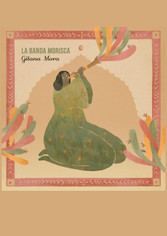
“La niña de la alhucema” by La Banda Morisca
April 23, 2020ONLINECasa Árabe channels on social media. #QuédateenCasa #JustStayHomeIn Spanish.We are beginning our festival “Nights of Ramadan 2020” with this short online concert given by La Banda Morisca. You can watch the music video on our social networking channels as of April 23.La Banda Morisca is one of the music groups in our country with the greatest following in the genre of “world music,” and it is celebrating its tenth anniversary this year.
To commemorate it, the band has published the album “Gitana mora” (“Moorish Gypsy”), a project to bring back memories of the women of Al-Andalus and make visible the immaterial legacy which those women left behind.
Musicians:
JoseMari Cala, vocals (El Cuervo)
José Cabral, string instruments (Jerez de la Frontera)
Belén Lucena, violin (Jerez de la Frontera)
Antonio Torres, wind instruments (Jerez de la Frontera)
Jerónimo Melgar, electric bass (Ceuta)
David Ruiz, percussion (Seville)
The video will be posted on our social media channels on April 23 (Youtube, Instagram, Facebook and Twitter).
-
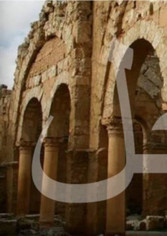
Conference on “Abd al-Rahman ‘The Émigré’: The myth of the last Umayyad”
April 29, 2020The conference will be broadcast live as of 6:00 p.m.ONLINECasa Árabe’s YouTube channel #QuédateenCasa #JustStayHome The conference will be broadcast live as of 6:00 p.m.In Spanish.As part of our festival “Nights of Ramadan 2020,” Daniel Valdivieso will be giving this conference about the life of the first Umayyad Emir of Al-Andalus. It will be taking place on Wednesday, April 29 on our YouTube channel.The history surrounding the historical figure of the man known to be the first Umayyad Emir of Al-Andalus, Abd al-Rahman “al-Dakhil,” is shrouded in myth and fantastic tales which present him as a paradigmatic figure. His opportune rise to power and his lineage were, in and of themselves, able to unite the Yemeni, the Quraysh and the Berbers under his command, because he was the son of an Amazigh woman and the only prince to survive the Abbasid revolution.This conference is an attempt to provide us with a brief introduction to the information appearing in written medieval sources and recompose both the historical context in the region around the year of 754 and the history of Abd al-Rahman al-Dakhil himself, in order to cast some light onto the legend which would lead to the advent of the powerful kingdom of Al-Andalus.Daniel Valdivieso Ramos (Cordoba, 1983)
With a bachelor’s degree in Psychology, his is now professionally devoted to the field of historical documentation and publishing. After spending a time at the publishing firm El Páramo, he took over the Department of Documentation at Utopía Libros, being responsible for large projects involving the historical heritage of Cordoba, as well as adapting and coordinating a wide range of publications of an institutional nature, such as Lucio Anneo Séneca (Lucius Annaeus Seneca, 2015), Iglesias Fernandinas de Córdoba (The Fernandine Churches of Cordoba, 2017), Guía de las Iglesias Fernandinas de Córdoba y sus barrios (Guide to the Fernandine Churches of Cordoba and Their Neighborhoods, 2018) and De la Ribera al Malecón (From the Shore to the ‘Malecón,’ 2019), this last book in conjunction with the Havana City Historian’s Office.
However, he carries out his main work studying medieval sources from Al-Andalus, especially from the Umayyad period, which has led him to perform tasks as a consultant for Sexto Mario Heritage and Education and as a heritage interpreter during many official activities held by the Madinat al-Zahra Archeological Site and Casa Árabe. Out of his interest in increasing awareness about these sources came his first book, La Córdoba de Ibn Hazm (Ibn Hazm’s Cordoba, Utopía Libros, 2016), a success with the public described by critics as “The best historical recreation of this ancient capital of the caliphs to have been written so far in the twenty-first century.” He is now making his prose debut by telling a tale as face-paced and exciting as that of the first Umayyad Emir of Al-Andalus based on the most thorough historical research. -
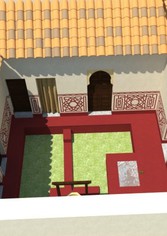 Recreation of a home from the twelfth century found in Orive (Cordoba): R. Blanco, J.M. Tamajón.
Recreation of a home from the twelfth century found in Orive (Cordoba): R. Blanco, J.M. Tamajón.Life turns inward
May 13, 20207:00 p.m.ONLINECasa Árabe’s YouTube channel #QuédateenCasa #JustStayHome 7:00 p.m.In Spanish.On Wednesday, May 13, archeologist Rafael Blanco will be giving an online conference in which he deals with the origin and concept of the Islamic inner courtyard house, its role in everyday life and its potential influences up to the modern day. The conference will begin at 7:00 p.m. on our Youtube channel.The domestic model of the “courtyard house” revolved around an inner courtyard inhabited by plants and filled with water-based items, forming the essential nerve center of indoor life in the cities of Al-Andalus. This housing arrangement was nothing new, but it was perfectly adapted to everyday Islamic life, providing a greater separation between the outside, understood to be a common area filled with risks and threats, and the indoor living space, considered the ultimate private stronghold for safety. This general concept has actually been quite widespread, with variations and nuances existing throughout history; when used, it has been extensively watered down in the West in recent decades. In a certain way, the current health care crisis has brought back to mind a feeling of insecurity coming from outside, one of domestic protectiveness which was commonplace in prior eras. For many generations now, however, this concept has been unknown to us in Europe, until 2020.
Rafael Blanco has a PhD in Archeology and is a professor in the Art History Department at the University of Cordoba. Throughout his scientific career, he has undertaken intensive study on the Islamic city and homes, specializing in the Cordoba of Al-Andalus, and the protection and dissemination of historical heritage. He has completed several scientific research stays in England, France and Germany, and has taken part in various research projects on the city of Cordoba, having recently directed the archeological study on the minaret tower of San Juan de los Caballeros. The results of his research have been written up in many different publications and at conferences both in Spain and abroad. He has also organized various congresses and event series, including “Urban Planning of Qurtuba,” “Landscapes of Power: Cordoba and the Umayyad estates (eighth to eleventh centuries” and “Great Capitals of the Medieval Islamic World: Past and present."
-
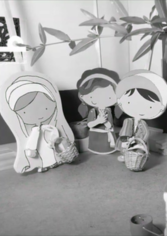
“Three Girlfriends from Qurtuba”
From May 14, 2020 until May 21, 2020ONLINECasa Árabe channels on social media. #QuédateenCasa #JustStayHomeIn SpanishFor young (and not so young) audiences, we are offering this video story: the tale of a mystery in eleventh-century Cordoba that puts friendship to the test. It will be shown in two episodes, on May 14 and May 21, on our social media.“Hanging over this Qurtuba home is the shadow of a doubt. The fate of a young woman is at stake. And friendship is put to the test.”
As part of the Nights of Ramadan 2020, you will get the opportunity to watch the story of “Three Girlfriends from Qurtuba,” a black and white video story in the style of a silent film intended for children. It was created by SextoMario for Casa Árabe.
This chat between three girlfriends from Qurtuba (the Arab name of Cordoba) in the eleventh century allows us to get a peek at various aspects of the role played by women in the culture of Al-Andalus, including the figure of the adiba, an enlightened wise woman who gave classes not only to women, but also to men. It shows the work performed by women in the world of medicine, as well as customs for marriage and even separating from one’s partner.
It is an entertaining yarn in which each character portrays a complementary image of Qurtuba society before the advent of Almohad religious fundamentalism. -
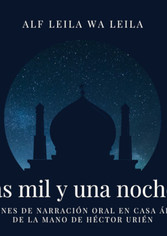
“The Arabian Nights”
May 16, 2020The session will be held on Saturday, May 16 at 7:00 p.m.ONLINEOn Casa Árabe’s Instagram channel #QuédateenCasa #JustStayHome The session will be held on Saturday, May 16 at 7:00 p.m.In Spanish.As part of our celebration “Ramadan Nights,” Héctor Urién is giving an oral storytelling session inspired by this Arab literature classic. It will be held live on Saturday, May 16 on our Instagram profile.In the month of May, we have another appointment for enjoyment with the tales from “The Arabian Nights,” and you won’t even need to leave your home to do so.
On this occasion, Héctor Urién will be using “magic” as the theme forming the common thread that plays the role of the famous “Open Sesame!” With his vivid voice, it will help him tell us some of the stories from The Arabian Nights related with that idea.
As you may be aware already, The Arabian Nights was not originally a set of tales meant for children, which is why we have always referred to these events as “oral storytelling for adults” in our programming. As an exception, bearing in mind that we all need to stay inside our homes with our families right now, Hector Urién has designed a special session for all audience this Saturday.
With a contemporary sensitivity, and using only his voice, presence and live discourse, Urién’s art as a storyteller takes us on a journey from a Baghdad souk to the cave where a genie dwells, and from the islands of the Indian Ocean to the domains of the Serpent Queen.
Héctor Urién (Madrid, 1977) makes his living from telling stories. As a professional storyteller, he creates his artistic work and stagecraft at theaters in Spain and Latin America. Drawn by his curiosity and and a deeply ingrained scientific streak, Urién has developed his own regular storytelling workshop in Madrid, where students and teacher discover the inner workings of stories and the mystery of oral storytelling together. As an on-stage storyteller, his most original and exciting project is related with “The Arabian Nights,” whose tales he normally tells one by one every Tuesday night at a small theater in downtown Madrid. A live narrator of short stories, he has taken part in several domestic and foreign festivals, as well as co-directing the annual festival “Ávila de cuento” (“Storybook Avila”). He had an essay published by the “Palabras del candil” publishing firm, as well: La narración fractal: arte y ciencia de la oralidad (Fractal storytelling: the art and science of oral tradition), in which he presents an innovative, surprising perspective on storytelling, backed by chaos theory and fractal geometry. And Alienta Editorial has published his book El arte de contar bien una historia. 101 estrategias para el storytelling (The Art of Telling a Story Well: 101 strategies for storytelling).
-
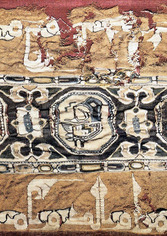 Tiraz of Hisham II. Madrid, Royal Academy of History, 2013.
Tiraz of Hisham II. Madrid, Royal Academy of History, 2013.“Indelible Marks in Cordoba”
May 22, 20206:00 p.m.ONLINECasa Árabe’s YouTube channel #QuédateenCasa #JustStayHome 6:00 p.m.In Spanish.As part of the Nights of Ramadan, we will be giving this virtual guided tour through some of the spaces related with the most important female personages to have lived in Islamic Cordoba, with the accompaniment of Inmaculada Serrano.On this tour, you will get a closer look at a series of key female figures in the history of Cordoba (and more specifically, from the ninth to the fifteenth centuries), and learn more about their social, cultural, political and economic contributions during the era of Al-Andalus. The goal is to highlight the important role played by women in different sectors of Cordoba society, talking about their life stories along with the inestimable legacy they left behind: “their steps towards equality.”
During the tour, we will visit several spaces related with the lives of these women, many of which are emblematic sites forming part of our city’s historical heritage. They are all women who stood out as exceptional individuals: Zayda, Shifá, Muryán, Subh, Lubna, Aisha and Wallada. And we will also learn more about several trades held exclusively by women, which were decisive in enriching the city of Cordoba in every realm of life: social, cultural, political and so on. These women performed work as copyists, secretaries, musicians, singers, poets, tailors and weavers, etc.The tour will include places like Casa Árabe, the Rey Heredia Cultural Center (former Convent of Santa Clara), Calle Alfayatas, the Sabat Gate, the Caliph’s Baths and the Statue of Lovers at the Campo Santo de los Mártires.
Ramadan is the most important month of the year for
millions of Muslims around the world. It is time devoted to inner
reflection, meeting with family and friends and sharing experiences. In
our country, Muslims are one of the religious communities with the
largest number of worshippers, many of whom are Spanish. Amongst them,
over 10,000 live in Cordoba and more than 300,000 in Andalusia as a
whole.
In this year of 2020, Ramadan began on April 23 (with slight variations in certain countries). Laylat al-Qadr or the “Night of Destiny” is estimated to be taking place on May 19, and Eid al-Fitr, the holiday when the end of Ramadan is celebrated, is scheduled to take place on May 24, 2020.
This year, these dates will be observed and celebrated in quite an unusual way. To be strictly complied with by everyone who is able, the fast is held every day of the month from sunrise to sunset. However, this year the lives of Muslim believers will be slightly different, as long as the state of alarm remains in place: because social distancing is encouraged, people will not be able to share the breaking of the fast, or Iftar, with the community. The required communal prayers cannot be held, and many Muslim emigrants who usually return to their countries of origin to fast with their loved ones will have to stay home. Ultimately, a series of traditions that were carried out along with the community will take place with a more virtual or online character this year.
In order to promote cultural integration and cooperation between the people who live side by side in the same public space, at the many editions already held in the past, the Nights of Ramadan event has become a unique meeting point for increasing awareness about the Muslim world’s culture, so present in our shared history, when some are able to celebrate their most important festivity of the year, while others come to share and learn about the lives of their closest neighbors.
In this year of 2020, Ramadan began on April 23 (with slight variations in certain countries). Laylat al-Qadr or the “Night of Destiny” is estimated to be taking place on May 19, and Eid al-Fitr, the holiday when the end of Ramadan is celebrated, is scheduled to take place on May 24, 2020.
This year, these dates will be observed and celebrated in quite an unusual way. To be strictly complied with by everyone who is able, the fast is held every day of the month from sunrise to sunset. However, this year the lives of Muslim believers will be slightly different, as long as the state of alarm remains in place: because social distancing is encouraged, people will not be able to share the breaking of the fast, or Iftar, with the community. The required communal prayers cannot be held, and many Muslim emigrants who usually return to their countries of origin to fast with their loved ones will have to stay home. Ultimately, a series of traditions that were carried out along with the community will take place with a more virtual or online character this year.
In order to promote cultural integration and cooperation between the people who live side by side in the same public space, at the many editions already held in the past, the Nights of Ramadan event has become a unique meeting point for increasing awareness about the Muslim world’s culture, so present in our shared history, when some are able to celebrate their most important festivity of the year, while others come to share and learn about the lives of their closest neighbors.

